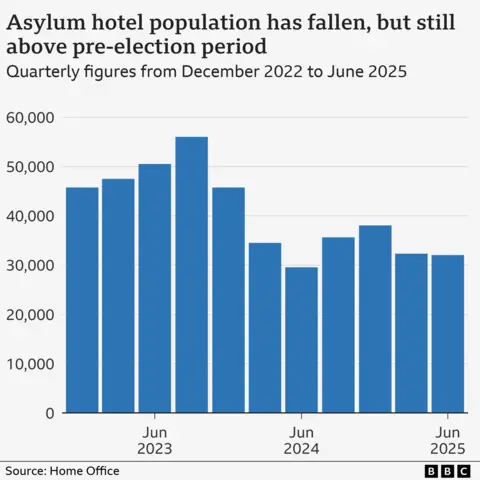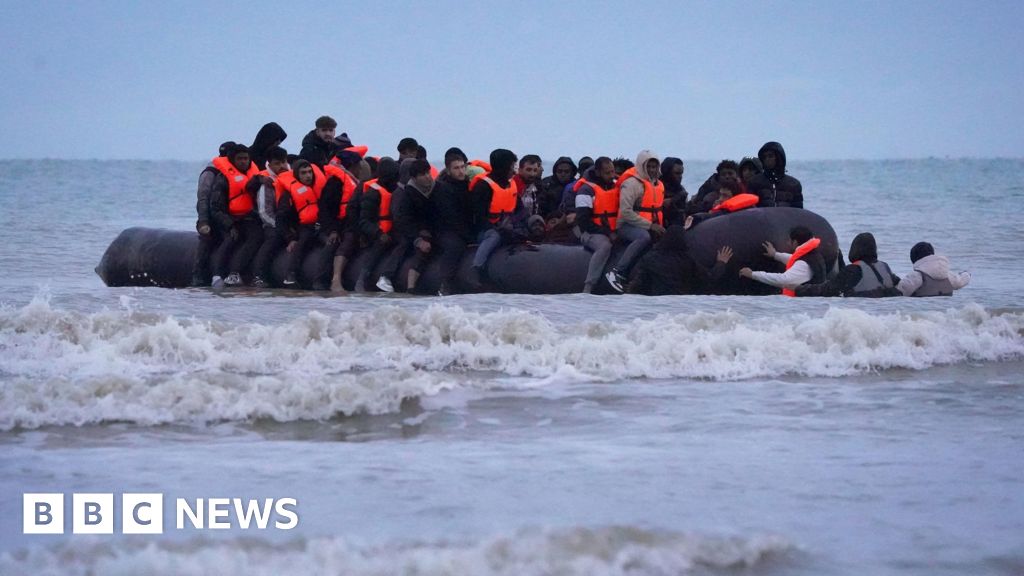Nick Eardley,Political correspondent and
Maia Davies & Jessica Rawnsley
 PA Media
PA MediaHundreds of asylum seekers could be housed in two military sites in Inverness and East Sussex as the government seeks to end the use of hotels.
Discussions are under way over the use of the sites to accommodate 900 men, as first reported in the Times. There are around 32,000 asylum seekers currently being housed in hotels.
Prime Minister Sir Keir Starmer has instructed Home Office and Ministry of Defence officials to accelerate work to locate appropriate military sites, the BBC understands.
The government has pledged to end the use of asylum hotels, which have cost billions of pounds and become a focal point for anti-migrant protests, by the next election.
Migrants are due to be housed in the Cameron Barracks in Inverness and Crowborough army training camp in East Sussex by the end of November, under plans being drawn up by ministers.
Defence Minister Luke Pollard told BBC Breakfast that the sites were not “luxury accommodation by any means,” but “adequate for what is required”.
“That will enable us to take the pressure off the asylum hotel estate and enable those to be closed at a faster rate,” he said.
The National Audit Office concluded in March 2024 that large sites such as military bases would cost more than hotels to accommodate asylum seekers.
Pollard said costs were currently being assessed and would “depend on the base”.
“But I think there’s something that is of greater significance that we’ve seen over the past few months, and that is the absolute public appetite to see every asylum hotel closed.”
He would not be drawn on how many asylum seekers were to be moved or when that would happen.
He said there would have to be sufficient engagement with local authorities and adequate security arrangements in place. “Those conversations have been going on for some time now,” he added.
Inverness’s Liberal Democrat MP Angus MacDonald told the BBC he supported the use of military sites to house asylum seekers, but that the chosen base seemed “a bit odd” given it is in the town centre.
“It’s effectively the same,” he told BBC Radio 4’s Today programme, adding that to his knowledge it was an open barracks without security.
“I very much thought the idea of putting them in army camps was to have them out of town, and make them less of an issue for the local population.”
The plans for Crowborough Training Camp have prompted a mixed response among residents.
One local recalled that there had not been any problems when Afghan families, evacuated during the withdrawal from Kabul in 2021, were previously housed there.
Others expressed concern about the impact on local services, with one stressing: “There’s enough people waiting for [doctor’s] appointments.”
Ministers are also considering industrial sites, temporary accommodation and otherwise disused accommodation.
Government sources told the BBC that all sites would comply with health and safety standards.
A Home Office spokesperson said: ”We are furious at the level of illegal migrants and asylum hotels.
“This government will close every asylum hotel. Work is well under way, with more suitable sites being brought forward to ease pressure on communities and cut asylum costs.”
As of June 2025, there were 32,000 asylum seekers being accommodated in hotels, a drop from a peak of more than 56,000 in 2023 but 2,500 more than last year.
A report on Monday found billions of taxpayers’ money had been “squandered” on asylum accommodation, with the Home Affairs Committee concluding hotels were being relied upon as a “go-to” solution rather than a stop-gap.
In response, Sir Keir said: “I can’t tell you how frustrated and angry I am that we’ve been left with a mess as big as this by the last government.”

Two former military sites – MDP Wethersfield, a former RAF base in Essex, and Napier Barracks, a former military base in Kent – are already being used after opening under the previous Conservative government.
Both house single, adult men. Wethersfield has a capacity of 1,245 and a typical maximum stay of nine months, while Napier can hold 328 men for up to 90 days.
In 2021 a High Court judge described Napier Barracks as “squalid” and overcrowded – with “filthy” facilities and “detention-like” settings – requiring government action.
The site has continued to operate and is due to be handed to Ministry of Defence in January, before being taken over by a housing developer in March.
The High Court was told in 2024 that Wethersfield was like a prison – with three migrants bringing a case against the former home secretary describing tensions and outbreaks of violence within its walls.
On Tuesday, several security workers who say they were suddenly dismissed from their jobs at Wethersfield, after walking out over pay and conditions, told the BBC that some residents there were violent and possessed weapons.
The site is run by Clearsprings Ready Homes – which has a 10-year contract with the Home Office to provide accommodation services to asylum seekers, including running asylum hotels.
The Home Affairs Committee also warned on Monday that using former barracks to house large numbers of asylum seekers had major drawbacks and could cost a similar amount to hotels.
Hosting an asylum seeker on Wethersfield barracks costs £132 per night – compared to the £144.98 average cost in a hotel – not including the £105m cost of converting the site.
Its report also highlighted “trade-offs” including isolation, limited access to healthcare and schools, and tensions with local communities.
Proposals to use other military bases in this way have previously been shelved following local backlash, such as RAF Scrampton in Lincolnshire.
Labour said the plans for the site – put forward by the previous Tory government – were scrapped last year because they did not represent value for money.
Pollard said last month that “every site” – including those previously considered – would be looked at as ministers sought alternatives to hotels.



